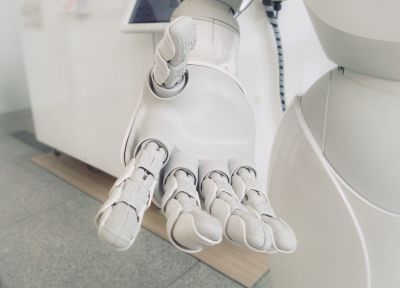How should Christians think about transhumanism?

Before Keanu Reeves was Neo, he was Johnny. The film “The Matrix” (1999) focused on humanity’s subjugation by artificial intelligence (AI). The movie Johnny Mnemonic (1995) portrays a society in which humans voluntarily opt in to “biotech” enhancements. While AI is far from approximating the sort of embodied sentience necessary to enslave humanity, we are currently adopting “biotech” enhancements “to improve the human condition” by “overcoming human vulnerabilities and injustices.”
Transhumanism is not simply about humans integrating devices into our bodies, though there is a growing subculture experimenting with biohacking by embedding magnets, RFID chips, or LED lights underneath their skin. According to “The Transhumanist Manifesto,” “the transhuman is a continuous human evolution” which involves “a confluence of organic human, technological advances in AI, nanomedicine, and gene therapies that mitigate disease, the devices and prosthetics and enhance biology that appends biology, and an awareness of personal identity, as a transformative, telematic, and expanded agency that expand through new tech-communication systems.”
Philosopher Nick Bostrom notes that transhumanism is “more than just an abstract belief that we are about to transcend our biological limitations by means of technology; it is also an attempt to re-evaluate the entire human predicament as traditionally conceived.” Bostrom goes on to note, “We must emphasize that what we should strive for is not technology instead of humanity, but technology for humanity.” While I appreciate Bostrom’s sentiment that technology be “for” rather than “instead of” humanity, it does raise questions about the human ends these means are intended to achieve. Without a clear vision of what it means to be human in the first place, it is difficult to believe we will arrive at a desirable end no matter what means we employ.
The question of ends was implicit in a debate on transhumanism held earlier this year. During the debate, columnist Mary Harrington suggests that “trying to re-engineer our physiology — our nature, if you will — in the interest of freedom, progress, or whatever” may result in a utopia that “arrives asymmetrically, depending on where you sit in the socioeconomic hierarchy.” If the end is some ambiguous utopia, it will be more utopian for some than for others. To some degree, the gap in experience, according to Harrington, will involve the commoditization of human beings because “you can’t have transhumanism without throwing out humanism.”
The asymmetrical utopian end won’t change simply because we have new technology. There will still be a drive to use one’s God-given gifts to one’s own advantage in a transhumanist utopia. Yet, it is unfair to judge transhumanism by postulating the ongoing presence of problems and bad actors.
So, how should Christians think about transhumanism? Setting aside speculation about some technological mark of the beast or about the various ways integrating technological devices with our bodies could be detrimental, it seems to me that the more basic concern is related to the tenets of the philosophy itself. For instance, in The Philosophy of Transhumanism, philosopher and transhumanist Max More suggests, “By thoughtfully, carefully, and yet boldly applying technology to ourselves, we can become something no longer accurately described as human — we can become posthuman … Posthuman beings would no longer suffer from disease, aging, and inevitable death (but they are likely to face other challenges).”
From a Christian perspective, such a statement is obviously problematic because “the wages of sin is death” (Rom 6:23). Technology can’t solve our sin problem even when construed “broadly to include the design of organizations, economies, polities, and the use of psychological method and tools.” Human intervention may be capable of postponing the inevitable, but overcoming sin and, by extension, death was accomplished by Christ. Human participation with Christ through faith is the means by which we also with conquer death (Rom 6:4-5).
In addition, More notes, “Transhumanists typically look to expand the range of possible future environments for posthuman life, including space colonization and the creation of rich virtual worlds.” The Bible portrays a relatively simple relationship between God, humanity, and the earth, which, as Old Testament scholar Christopher J. H. Wright has observed, remains intelligible through God’s program with Israel (God, Israel, and the Land) and the ultimate restoration of all things (God, in-Christ humanity, and the new creation). Humanity cannot be separated from the earth. Our relationship with the earth is intrinsic to who we are, tragic due to the fall and subsequent curse, and inevitable as redeemed humanity will live in God’s presence as part of the new creation. Space colonization may be possible, but, like the Tower of Babel (Gen 11:1-9), attempts to build a community in this fashion are, at best, ill-advised. Virtual worlds are similarly problematic, though for reasons I’ve noted elsewhere.
Christians should be appropriately wary of technology for a host of reasons. Transhumanism, however, is not problematic because of its interest in technology. It is problematic because it is pursuing aims (some of which may be attainable) uninformed by God’s Word. As a movement, it is focused on overcoming human limitations with technologies “made with human hands” rather than recognizing that human limitations require us to look beyond ourselves for solutions.
The answer to the problem of human frailty will not be found in a new technology but in life, death, and resurrection of Jesus Christ.
Dr. James Spencer currently serves as President of the D. L. Moody Center, an independent non-profit organization inspired by the life and ministry of Dwight Moody and dedicated to proclaiming the Gospel and challenging God’s children to follow Jesus. He also hosts a weekly radio program and podcast titled “Useful to God” on KLTT in Colorado. His book titled “Christian Resistance: Learning to Defy the World and Follow Jesus” is available on amazon.com. He previously published “Useful to God: Eight Lessons from the Life of D. L. Moody,” “Thinking Christian: Essays on Testimony, Accountability, and the Christian Mind,” as well as co-authoring “Trajectories: A Gospel-Centered Introduction to Old Testament Theology.”




















